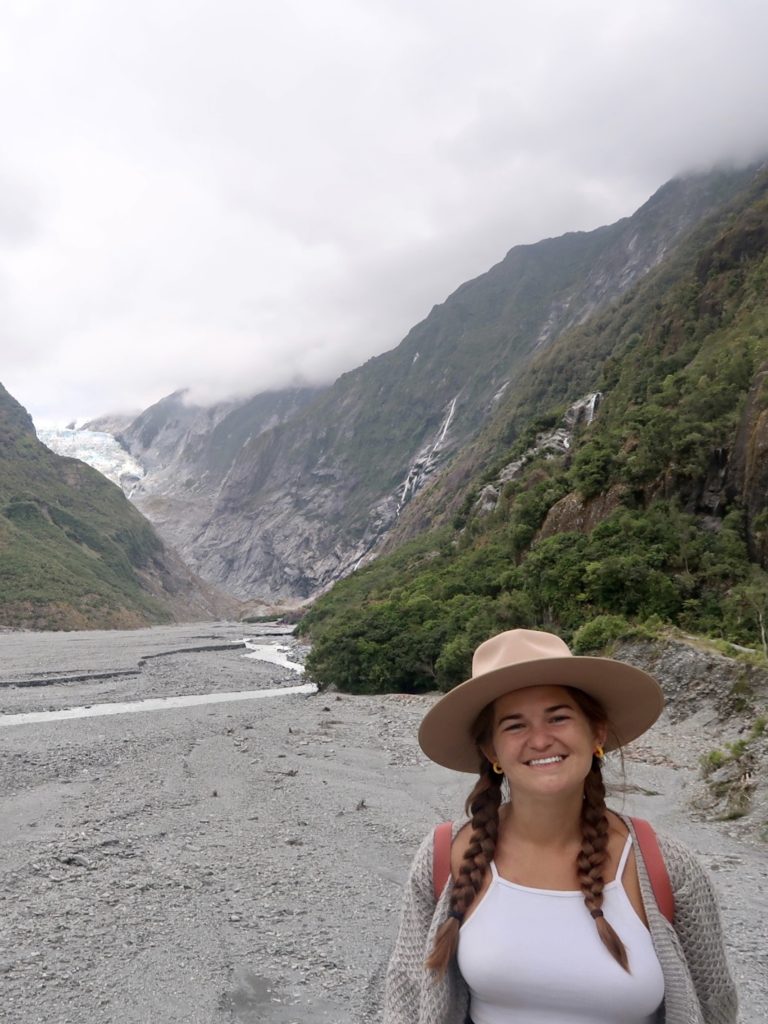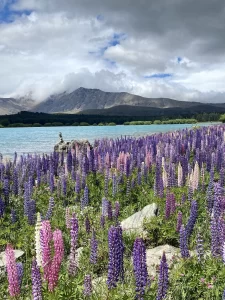Starting a new life by moving to a different country (and continent, and hemisphere) is hard. People do things differently, and sometimes learning how things work is confusing. Despite our shared language, living in New Zealand is much different than living in the United States! Read on for a list of 12 important things to know before moving to New Zealand — the good, the bad, and the ugly.
Disclosure: Some of the links below are affiliate links. When you purchase through links on my site, I may make a small commission (at no extra cost to you!).
- 1. When New Zealanders tell you that sunscreen is important, they mean it
- 2. You speak the same language (kind of)
- 3. Maori language and culture are prevalent in everyday life
- 4. Homes aren't well-insulated
- 5. Going barefoot is normal
- 6. The North and South Islands are quite different
- 7. There are more sheep than people
- 8. You're a long, long way from home
- 9. Getting a visa can be tough
- 10. The community actually cares about you
- 11. Cost of living is really high
- 12. Don't try to compare New Zealand to your home country

1. When New Zealanders tell you that sunscreen is important, they mean it
New Zealand’s ozone layer is depleting. That, combined with the sun’s position and the country’s lack of pollution, means that it’s super important to wear sunscreen every day. Yes, every single day. Even when it’s cloudy, the sun is still stronger here than you’re probably used to!
A great resource to use is Metservice.com. When you search for a city in New Zealand, it will tell you the current UV level, whether it’s dangerous, and for how long you need to wear extra protection.
2. You speak the same language (kind of)
American English and New Zealand English are quite different.
Despite sharing the same general language structure, I often find myself getting a bit confused when having a conversation. The accent, slang terms, word choice, intonation, and speed of talking can make understanding Kiwis tricky (even more so after a few beers). This is important to know before moving to New Zealand so that you’re not blindsided by the differences.
3. Maori language and culture are prevalent in everyday life
Coming from the States, where Indigenous languages and culture aren’t recognized as often, I was pleasantly surprised to see how often Maori culture is integrated into everyday life. Māori is an official language, along with New Zealand Sign Language — English didn’t make the cut!
Common phrases, such as kia ora, kia kaha, and haere ra are used almost every day. Most signs are written in both English and te reo Maori. The Maori culture is intertwined (and inseparable) from Kiwi culture. It’s a beautiful thing and something to be proud of when living in New Zealand.
4. Homes aren’t well-insulated
This is one of the biggest disadvantages of living in New Zealand. Even modern, new homes are not as well-insulated as we’re used to in the United States. In my experience, it’s not common for homes to have central heating or air conditioning, either. Thankfully, because of the country’s temperate climate, this isn’t as big of a deal as it would be in, say, Minnesota.
In the winter, multiple layers, wool blankets, and wood-burning fireplaces are key. By summertime, expect to keep all your windows open to let in a breeze (which also lets in all the flies — see disadvantages above).

5. Going barefoot is normal
Don’t be alarmed when you see grown men walking barefoot at the supermarket — it’s normal.
Kiwi culture is extremely laid back, even compared to the United States. Going barefoot also represents freedom and having a connection with nature, something that is often lacking in American society. It’s also possible that Kiwis are part-Hobbit (I kid!).
6. The North and South Islands are quite different
Your experience in New Zealand will be different based on which island you live on.
New Zealand’s North Island is home to big cities like Auckland and Wellington. You’ll get more of a big-city vibe in these places compared to in the South Island. It also has a much larger proportion of Maori people, making it feel much more diverse both culturally and linguistically.
The South Island has a lot less people in general. You’ll find more diverse landscapes and space to roam around. The largest cities, Christchurch and Dunedin, feel more mellow and suburban than cities in the North Island.
There is also a bit of a divide between urban and rural. Anytime you turn on the TV or radio, there seems to be a debate about the New Zealand government vs. farmers, or farmers vs. climate change activists. The larger cities are disconnected from rural areas (and vise versa).
7. There are more sheep than people
Expanding a bit on the previous point, New Zealand in general probably has fewer people than you’re used to. Personally, the change from living in Chicago to the town of Twizel was a bit jarring. What New Zealand lacks in human population, however, it makes up for in sheep.
Sheep (and other livestock like cows and pigs) are everywhere. You’ll see tons of them on the side of the road whenever you drive anywhere. I’ve also seen them on hikes in national parks and in people’s backyards in town. While Kiwis don’t think twice about them, I still find myself squealing whenever we drive past.
8. You’re a long, long way from home
No matter what country you’re coming from, you’ll be very far from home when moving to New Zealand. The sheer physical distance and time differences can make the move seem especially isolating. As a new arrival, you’ll need to try extra-hard to keep up with family members and friends back home (and even then, you’ll often feel like you’re out of the loop). It may also be a long time before you’re able to travel back to your hometown to visit.
Living in a small town in a small country can be difficult for your mental health, especially when you’re used to living in places with a lot of people. The best way to cope is to enjoy the country for what it does well: participate in the outdoor activities, enjoy the good food, and soak in the beautiful scenery.
This is all normal and difficult, but it gets better with time. Eventually, you’ll make new friends and find ways to connect with your older ones that work for you. The good news is that you now live in a great country that lots of people want to visit!
9. Getting a visa can be tough
Whether you’re here on a working holiday visa, a skilled migrant visa, a partner visa, or something else entirely, the entire visa process can be quite complicated. There are many different types of visas that you can apply for based on your personal situation, work experience, and nationality (Australian citizens have a big advantage here!).
You’ll need to make sure that you’re following all the terms of your visa requirements and applying for a new one well in advance of the expiration date. Overstaying a visa can jeopardize your chances of staying in the country and is a really big deal!
A popular New Zealand visa that foreigners often get is a work visa. Most of the time, you’ll need to already have a job offer before entering the country or work in an industry that’s on the skill shortage list. You can check the New Zealand immigration website for more information!
For those making a big move and wanting to stay in the country long term, applying for residency is the next step. Once you’ve secured that, you’ll have to wait at least two years before applying for permanent residency. Permanent residents don’t have travel conditions and can vote in elections and apply for a New Zealand passport.
⇉ How to Get a New Zealand Critical Purpose Visitor Visa in 2020
10. The community actually cares about you
Especially coming from somewhere like the United States, it’s amazing to see how a community can care about its residents. New Zealand has a very inexpensive public healthcare system and most jobs offer a great work-life balance. There are great maternity and paternity leave options as well. As a worker, you’ll get treated fairly and paid a living wage. The standard of living is really high, which makes New Zealand a great place to live!
11. Cost of living is really high
Because of the high standard of living, most things in New Zealand will cost more than you’re used to. Groceries, rent, a full tank of fuel, shipping prices — all of these can be insanely expensive. I’ve been here for over a year now and the sticker shock never truly goes away.
Are you used to getting free, overnight shipping on all of your online purchases? Say goodbye to that, because shipping will now cost you an arm and a leg.
Given that New Zealand is a small island nation on the opposite side of the world, it makes sense that imported goods will cost more than they do elsewhere. To help keep costs down, it helps to purchase locally and seasonally.
Besides the high cost of everyday items, the housing market is also pretty insane. Old and run-down houses sell for a lot more money than they probably would in the United States. Owning a house (or multiple) is a point of pride for Kiwis, so investing in the real estate market in some way is commonplace.
12. Don’t try to compare New Zealand to your home country
Because it’s never going to be quite the same. A good phrase that I learned recently is, “It’s not good or bad — it’s just different.” This is important to remember whenever moving to a new country. Since you’re the one coming in, you have to be the one to accept the lifestyle (along with all of its flaws).
You’ll also love:
- Hiking the Lake Benmore Peninsula Track in Otematata
- How to Travel New Zealand on a Budget (21 Money-Saving Tips)
- Rating Classic New Zealand Snacks
Thanks for reading this post on things to know before moving to New Zealand! I know that for me, these were the most prevalent differences I came across. Stay tuned for more posts coming soon!
xoxo Niki
Pin this post to save it for later!



Hey Nikki – I just arrived back to nz from four years away and feel like a tourist in my own country. Is great. I’m loving your blogs. Are you still here in nz?
Hey Stephanie! Thanks for the kind comments 🙂 Yep, I’m living in Twizel at the moment. Whereabouts are you?